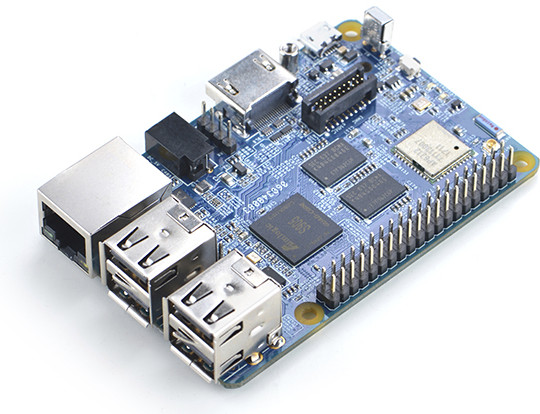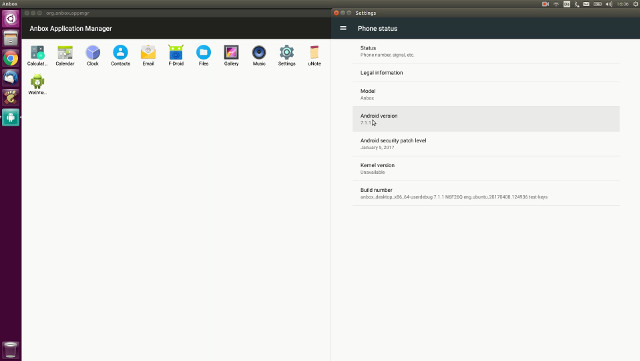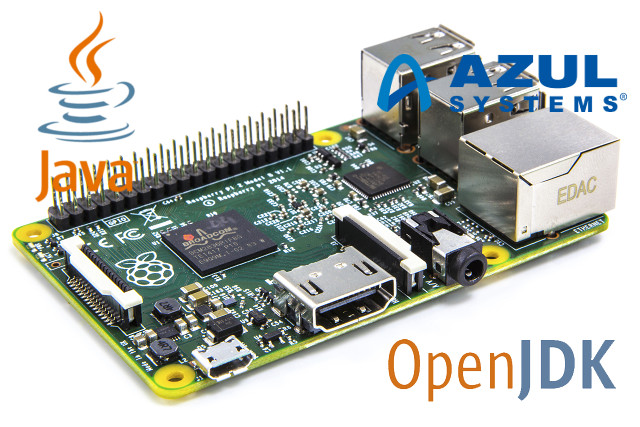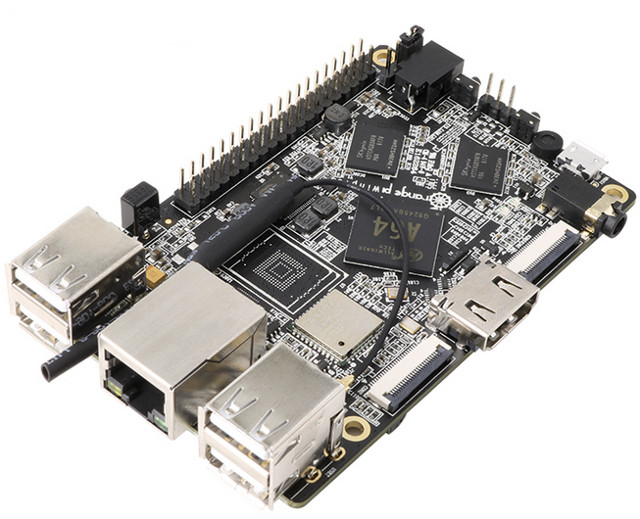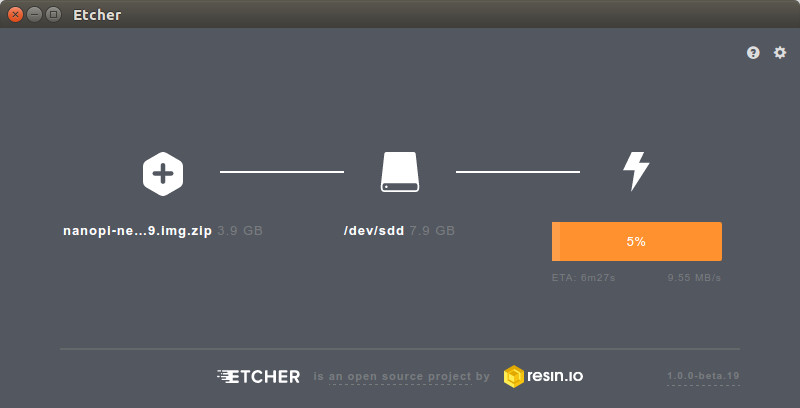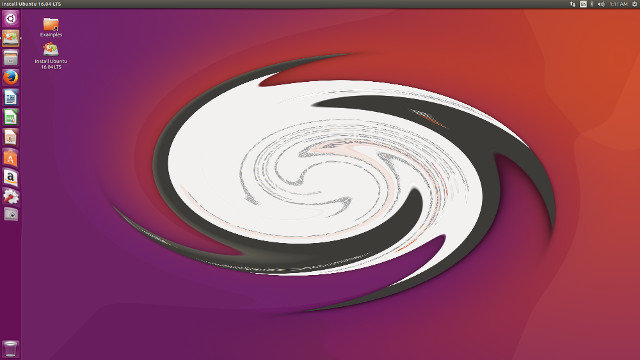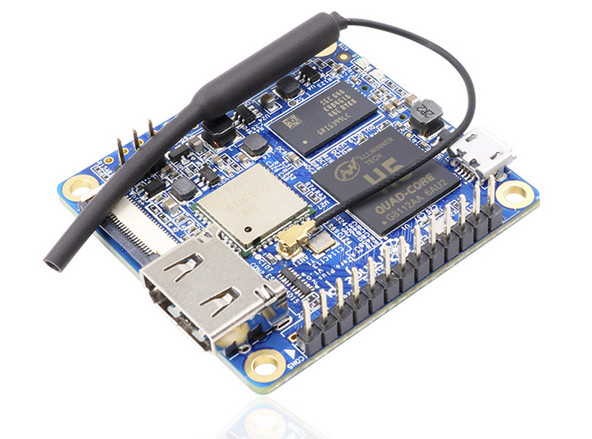Hardkernel ODROID-C2 board is getting some direct competition with FriendlyELEC’s NanoPi K2 development board powered with Amlogic S905 processor with 2GB RAM, a very similar form factor, and many of the same features, which together with Khadas Vim (Pro) brings the number of low cost Amlogic based development boards to three. NanoPi K2 board specifications with differences compared to ODROID-C2 highlighted in bold or stricken-through: SoC – Amlogic S905 quad core cortex-A53 processor @ 1.5 GHz with penta core Mali-450MP GPU System Memory – 2GB DDR3 Storage – eMMC module socket, micro SD slot Video Output – HDMI 2.0 up to 4K @ 60 Hz Connectivity – Gigabit Ethernet (Realtek RTL8211F), 802.11 b/g/n WiFi + Bluetooth 4.0 (AP6212 module) with chip antenna + IPX connector USB – 4x USB 2.0 host ports (GL825G USB hub) + micro USB OTG port for power and adata Expansion Header 40-pin header with GPIO, […]
Anbox Allows You to Run Android Apps Natively in Ubuntu Linux
It’s been possible to run Android app in computers for a while with solutions such as Bluestacks or ShashLik, as well as running Android-x86 ISO in a virtual machine. But all those solutions rely on emulation, may not have the best performance, and at the time I tried them did not really work well, or were inconvenient to use. Anbox is different as instead of running its own Linux kernel for Android, it leverages the Linux kernel in Ubuntu for better integration and performance, and use an LXC container to run Android. Anbox has been tested with Ubuntu 16.04, but should also work with other recent Ubuntu distributions. Installing Anbox (Alpha) is easy, and can be done with a single command line:
|
1 |
sudo snap install --classic anbox-installer && anbox-installer |
The command will modify your system with the following: Add the anbox-support ppa ppa:morphis/anbox-support to the host system Install the anbox-modules-dkms deb package from the ppa which will […]
Azul Systems’ Zulu Embedded is a Build of OpenJDK for ARM, MIPS, PowerPC, and x86 Compliant with Java SE standard
Yesterday as I wrote about the Embedded Systems Conference 2017 schedule I came across a potentially interesting talk entitled “Building A Brain With Raspberry Pi and Zulu Embedded JVM” by Azul Systems that will explain how to build a brain emulator using a cluster of Raspberry Pi boards. I wanted to find more about it, but I have not been able to find any details about the project/demo at this stage. However, I could still learn a bit more about Zulu Embedded, which is said to be an open source Java Virtual Machine based on OpenJDK, compliant with Java SE standard, working on 32-bit & 64-bit ARM & x86, MIPS, and PowerPC, as well as multiple operating systems. Some of the key features of Zulu Embedded include: Java Support – Java 6, 7, 8, and 9 when available Java Configurations – Headless, headful, or compact Java Compact Profiles Hardware – […]
Canonical Refocuses Ubuntu Development Efforts on Cloud and IoT, Drops Convergence and Mobile
Mark Shuttleworth has published a new blog post in Ubuntu Insights, and this is not all good news, as the title “Growing Ubuntu for Cloud and IoT, rather than Phone and convergence” implies. Canonical has decided to drop Unity8, and replace it with Gnome in Ubuntu 18.04, and by extension stop any investment in Ubuntu phone and convergence. The main reasons given for the drop were that few commercial partners were interested in the project, preferring to stick with the most popular mobile operating systems like Android, and the community did not see the work as innovation, but instead fragmentation, probably referring to the Mir vs Wayland saga. On the better news, Canonical is still committed to work on Ubuntu desktop, and will focus on the Cloud and IoT applications such as automotive, robotics, networking, and machine learning, for which the company has gone well so far with multiple commercial […]
Shenzhen Xunlong Releases Two Orange Pi Boards with 64-Bit ARM Processor, 2GB RAM
Shenzhen Xunlong has already been selling 64-bit ARM development board with their Orange Pi PC 2 & Orange Pi Zero Plus 2 H5 boards based on Allwinner H5, as well as Orange Pi Win board powered by Allwinner A64 processor. However, so far none of them are equipped with much memory, with the only options being 512MB or 1GB RAM. The company has recently launched two new boards with 2GB RAM, namely Orange Pi Win Plus featuring Allwinner A64 SoC, and Orange Pi Prime equipped with Allwinner H5 SoC. Orange Pi Win Plus That board is just an update to Orange Pi Win board with the only difference I could find being the 2GB RAM: SoC – Allwinner A64 quad core ARM Cortex A53 processor @ 1.2 GHz with Mali-400MP2 GPU System Memory – 2GB DDR3 Storage – 2MB SPI flash, micro SD slot up to 64GB, footprint for optional […]
NanoPi NEO2 Board Benchmarks with Ubuntu 16.04.2 using Linux 3.10 and Linux 4.10
I’ve received NanoPi NEO 2 boards, add-boards and sensor modules last week, where we could see how small the boards were, and how it could be suitable for IoT projects or “hardware hacking” education. Before testing the board with the add-ons, I have to select the image to run on the board, and currently we have two choices: Ubuntu 16.04.2 FriendlyELEC image with Linux 3.10 “legacy” kernel, or Armbian Ubuntu 16.04.2 Xenial nightly build with Linux 4.10 “mainline” kernel. So I decided to try both: dfssf nanopi-neo2-ubuntu-core-qte-sd4g-20170329.img.zip (296 MB) is the image from FriendlyELEC (previously FriendlyARM) Armbian_5.27.170401_Nanopineo2_Ubuntu_xenial_dev_4.10.0.7z (222 Mb) is the image from Armbian, which I downloaded on March 31st despite the filename including “170401” string You can flash the image with Win32DiskImager (Windows) or dd (linux) to a micro SD card the usual way, and while I’ve never personally had troubles with dd, I’ve been told Etcher was better, […]
isorespin.sh Script Updates Ubuntu ISO Files with Mainline Linux Kernel
Devices based on Intel Bay Trail and Cherry Trail processors have been popular due to their integration into low cost system (for an Intel platform), but Intel did not prioritize Linux development for those processors, so while Linux could run, you’d have various problems with HDMI audio, system freezes, and wireless drivers, unless you used a custom kernel. The goods news is that Linux 4.11 will feature fixes for HDMI audio and system freeze, and so you won’t need a custom kernel anymore. Ian Morrison (Linuxium), who has been working on improving Linux for those devices since they were first released, has now released isorespin.sh script to automatically update any Ubuntu ISO image to the latest mainline Linux RC kernel built by Canonical, but not integrated by default in the ISO. Once you’ve downloaded isorepin.sh and your ISO of choice, e.g. ubuntu-16.04.2-desktop-amd64.iso, you can update the ISO with mainline Linux […]
Orange Pi Zero Plus 2 H5 Board Replaces Allwinner H3 by Allwinner H5 for $1 More
It’s hard to keep up, but Shenzhen Xunlong has launched another Orange Pi board, as two weeks after introducing Orange Pi Zero Plus 2 development board, the company has now introduced “Orange Pi Zero Plus 2 H5” board, with the exact same specification, except Allwinner H3 quad core Cortex A7 32-bit processor has been replaced by Allwinner H5 quad core Cortex A53 64-bit processor. Orange Pi Zero Plus 2 H5 board specifications: SoC – Allwinner H5 quad core Cortex A53 processor with 2+4 core Mali-450MP4 GPU System Memory – 512 MB DDR3 SDRAM Storage – 8GB eMMC flash + micro SD card slot Video Output – HDMI port Connectivity – 802.11 b/g/n WiFi + Bluetooth 4.0 LE (Ampak AP6212) with u.FL antenna connector and external antenna USB – 1x micro USB OTG port Camera – MIPI CSI port Expansion headers – Unpopulated 26-pin “Raspberry Pi B+” header + 13-pin header […]


